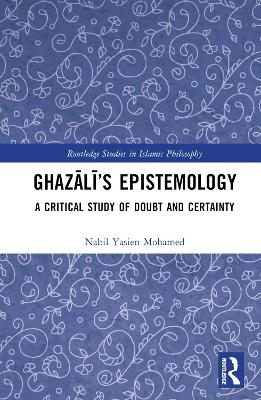
Ghazālī’s Epistemology
A Critical Study of Doubt and Certainty
Seiten
2023
Routledge (Verlag)
978-1-032-51706-3 (ISBN)
Routledge (Verlag)
978-1-032-51706-3 (ISBN)
Focusing on Abū Ḥāmid al-Ghazālī (d. 1111) – one of the foremost scholars and authorities in the Muslim world who is central to the Islamic intellectual tradition – this book embarks on a study of doubt (shakk) and certainty (yaqīn) in his epistemology.
The book looks at Ghazālī’s attitude to philosophical demonstration and Sufism as a means to certainty. In early scholarship surrounding Ghazālī, he has often been blamed as the one who single-handedly offered the death-blow to philosophy in the Muslim world. In much of contemporary scholarship, Ghazālī is understood to prefer philosophy as the ultimate means to certainty, granting Sufism a secondary status. Hence, much of previous scholarship has either focused on Ghazālī as a Sufi or as a philosopher; this book takes a parallel approach, and acknowledges each discipline in its right place. It analyses Ghazālī’s approach to acquiring certainty, his methodological scepticism, his foundationalism, his attitude to authoritative instruction (taʿlim), and the place of philosophical demonstration and Sufism in his epistemology.
Offering a systematic and comprehensive approach to Ghazālī’s epistemology, this book is a valuable resource for scholars of Islamic philosophy and Sufism in particular, and for educated readers of Islamic studies in general.
The book looks at Ghazālī’s attitude to philosophical demonstration and Sufism as a means to certainty. In early scholarship surrounding Ghazālī, he has often been blamed as the one who single-handedly offered the death-blow to philosophy in the Muslim world. In much of contemporary scholarship, Ghazālī is understood to prefer philosophy as the ultimate means to certainty, granting Sufism a secondary status. Hence, much of previous scholarship has either focused on Ghazālī as a Sufi or as a philosopher; this book takes a parallel approach, and acknowledges each discipline in its right place. It analyses Ghazālī’s approach to acquiring certainty, his methodological scepticism, his foundationalism, his attitude to authoritative instruction (taʿlim), and the place of philosophical demonstration and Sufism in his epistemology.
Offering a systematic and comprehensive approach to Ghazālī’s epistemology, this book is a valuable resource for scholars of Islamic philosophy and Sufism in particular, and for educated readers of Islamic studies in general.
Nabil Yasien Mohamed is a fellow at the Cairo Institute for Liberal Arts and Sciences. His research interests include Ghazalian studies, classical Islamic philosophy, Sufism, contemporary Islamic thought, ecology, theology, epistemology, and ethics.
Introduction 1. Ghazālī’s Scepticism and Quest for the Foundations of Knowledge 2. Certainty at the Nexus between Reason and Religious Authority 3. Scepticism, Certainty and the Philosophical Tradition 4. Certainty within the Sufi Tradition Epilogue
| Erscheinungsdatum | 21.11.2023 |
|---|---|
| Reihe/Serie | Routledge Studies in Islamic Philosophy |
| Verlagsort | London |
| Sprache | englisch |
| Maße | 156 x 234 mm |
| Gewicht | 450 g |
| Themenwelt | Geisteswissenschaften ► Philosophie ► Erkenntnistheorie / Wissenschaftstheorie |
| Geisteswissenschaften ► Philosophie ► Östliche Philosophie | |
| Geisteswissenschaften ► Religion / Theologie ► Islam | |
| Sozialwissenschaften ► Soziologie ► Spezielle Soziologien | |
| ISBN-10 | 1-032-51706-9 / 1032517069 |
| ISBN-13 | 978-1-032-51706-3 / 9781032517063 |
| Zustand | Neuware |
| Haben Sie eine Frage zum Produkt? |
Mehr entdecken
aus dem Bereich
aus dem Bereich
die Grundlegung der modernen Philosophie
Buch | Softcover (2023)
C.H.Beck (Verlag)
18,00 €
Buch | Softcover (2023)
Reclam, Philipp (Verlag)
7,00 €


![Was heißt Denken?. Vorlesung Wintersemester 1951/52. [Was bedeutet das alles?] - Martin Heidegger](/media/113619842)